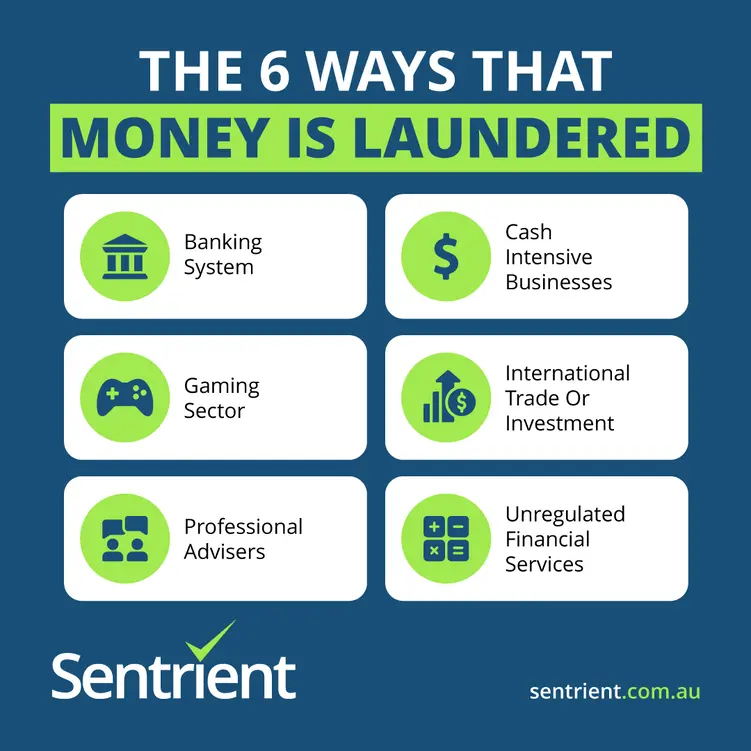Criminals use diverse methods to launder money which is the proceeds of crimes such as drug trafficking, terrorist activities, and tax evasion. As with other criminal activity, these methods are used to sidestep regulatory and law enforcement measures and to exploit current and emerging channels.

1. Banking system
The major channel for money laundering is the banking system.
Examples:
- banks
- foreign exchange
- money transfer
- offshore banks
- remittance services.
2. Cash intensive businesses
A less visible channel is where criminals are connected to businesses that have a high volume of legitimate cash flow.
Examples:
- building and construction
- convenience store
- entertainment
- motor vehicle retail sectors
- restaurants, hotels, pubs, and clubs
- taxi services
3. Gaming sector
Another significant channel for money laundering is the gaming sector because in addition to gambling, many casinos and gaming facilities offer services similar to financial institutes. This includes accounts, foreign exchange, money changing, electronic funds, transfers, cheque issuing, and safety deposit boxes.
Examples:
- casinos
- pubs and clubs that have racing and sports betting facilities
4. International trade or investment
International trade or investment is a less visible channel for money laundering.
Examples:
- cross-border movement of cash
- real estate purchased with laundered funds
- purchase of luxury items, such as jewellery that can be moved across borders
- securities or other financial instruments that are purchased in the launderer’s legitimate business entity names.
5. Professional advisers
Money launderers may seek assistance from professional advisers, such as financial advisers or legal advisers, either knowingly or unknowingly.
Sophisticated money launders use professional advisers who work around the laws, regulations, and controls in the financial sector or who understand how to utilise schemes in countries with non-existent or weak anti-money laundering and counter-terrorism financing controls.
6. Unregulated financial services
Emerging channels in crypto-currency exchange, such as Bitcoin and Ripple, present new avenues for money laundering.
Find out how you can access online learning on anti-money laundering and counter-terrorism financing now.
Sentrient provides an online AML and CTF course that enables a Reporting Entity to deliver robust training for its staff that has been legally endorsed and covers legislation for all states and territories in Australia.
For more information, contact us at 1300 040 589 or visit our website at www.sentrient.com.au today.
Read More About Anti Money Laundering And Counter Terrorism Financing:
- 4 Ways to Identify Potential Money Laundering Activity
- The 3 Stages of The Money Laundering Process Explained
- 3 Biggest Impacts of Money Laundering
- New Compliance Course Released – Anti Money Laundering and Counter Terrorism Financing Training
- The 6 Ways That Terrorism Is Financed
- The 3 Stages of The Terrorism Financing Cycle Explained





